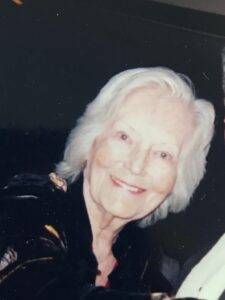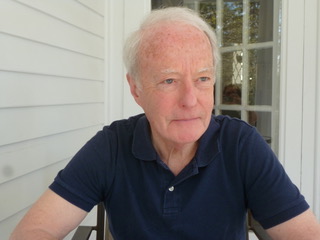
My mother at ninety years-old
While days like Mother’s Day are corny, they do elicit memories. I think of my mother. She died at the age of 100. Although she was quite debilitated at the time, she still kept asking me not to let her go, as if I had such power. She was afraid of death, but when I looked at her photo this morning, I felt she wasn’t dead or buried in Gate of Heaven Cemetery in Hawthorne, New York where thirteen years ago we placed her next to our father and her husband Edward of sixty years.
“The dead don’t stay where they are buried,” the English writer John Berger’s mother tells him when he sees her in Lisbon seated on a park bench fifteen years after her death. Here Is Where We Meet is the book where you can read of this encounter and more. And there is much more, as when John remembers his mother saying to him when he was thirteen years-old, “Most people, she said, can’t stand the truth. It’s too bad but there it is, most people can’t stand it. You, John, I think you can bear the truth, we’ll see. Time will tell. I didn’t reply.”
When I spoke to my mother this morning, she told me to not make it public because people will think I am crazy. She was always worried that I would put myself in danger by saying or doing controversial things. But she knew also that I would not heed her advice and she was glad for that as well – secretly. When I told her what Berger’s mother said to him, she said, “Of course she was right. Would you stay buried there?”
It didn’t seem appealing, but I didn’t answer her.
“Where are you now?” I asked her.
“Don’t be too nosy, Eddy,” she said.
“I always want to know everything,” I said.
“There are some things best left alone. You are in one side of the world and I am in another. Let’s leave it at that.”
“Don’t you remember when I gave the eulogy at your funeral and I said you had a favorite saying about how the truth shall make you free?”
“I remember, but you also recalled my other favorite about being true to your own self, and I feel where I am at the moment would be of no help to you. I get around.”
Okay, Mom, but would you agree with what I more or less said about you in my eulogy? It went something like this : My mother was an artist at heart, and being an artist, she possessed all the bittersweet attributes that come with such a gift. She never developed the conventional shell that allows most people to hide their true feelings. She was a raw nerve, and had a nerve, and this could unnerve others who were content with euphemisms. But she was also a thwarted actress, and this complicated everything, for when an artist/actress has few opportunities to express themselves, a frustration seeps in. My mother suffered from such frustration, and it was sad. (It’s called being an artiste-manque by the great Otto Rank, the Austrian psychoanalyst, who in his masterpiece, Art and the Artist wrote: “The artist does not create, in the first place, for fame or immortality; his production is to be a means to achieve actual life, since it helps him to overcome fear.”)
“Yes, my dear son, I was afraid of something I couldn’t name and it haunted me. It goes back to many things when I was young, maybe thirteen years-old, and my father, with whom my mother and I didn’t live until I was ten and I had never met till then, put his policeman’s gun on the table and threatened us to obey him or else. The ‘else’ entered me and never left. He stood in my way then, and my mother’s sticking with him after really frightened me. I wanted to live my own life, but he thwarted me at every turn and my mother suffered through it as an accomplice because she too was afraid.”
Then I was right to say about you that in your pilgrim soul you always suffered from faith and doubt, hope and despair, and “she fleetingly wished to be blissfully ignorant, But that was not her destiny. She wanted more. She knew that so-called blissful-ignorance was beneath her dignity. She had soul, and as the poet John Keats wrote, ‘This life is a vale of soul-making,’ and Rita Mary Rose struggled mightily in that endeavor.”
I heard you then, Eddy, and I felt so close to you for grasping my struggles. I remember you also said that as an artist of life, a great mother – I gave birth to “nine children, losing three of them along the way – a heartache impossible to grasp, and that the artist in her, the seeker that she was, wanted more.” You said it perfectly, as I remember well, you also said that I loved and nurtured you all as best I could. That is so true. I did my utmost best, but I know it wasn’t perfect. After a twenty year span of being pregnant and giving birth from the age twenty-two, and another twenty of raising all of you, I wanted to give birth to the parts of me that lay fallow. You were right to say that I wished, maybe unconsciously, especially for your sisters, that they live out the parts of me that fate and circumstances and fear prevented me from achieving. My dreams for them were quite superficial – to be discovered for their looks by some Hollywood mogul – for so much was focused on their appearance, as mine was for me.
I know you were frustrated, and when we were all grown and gone you hoped for more. But like John Berger’s mother you had that favorite phrase: “it’s too late.” You were saying that when you were in your mid-fifties and had so long to live. It’s never too late, I always thought, for time is always present, but time is the enemy when looks are emphasized, but you even escaped that fate. You were a beautiful woman into old age. Yet looks need accomplishments and they demand the courage to create, and fear needs to be overcome for that. Sentimentality won’t do it, and you got a bit sentimental with some of your paintings as you aged.
You were not the grandmotherly type, and while it irritated me, I understood it. You were an artist with a soul and needed more than the mother title. You wanted to use your poetic and artistic abilities to create a new life beyond that of only mother and grandmother. Some us found that hard to accept even though it was obvious.
As your favorite son – an appellation unearned since there was no competition – I want to honor you for all your strivings for a second and third life. You deserve it. You suffered and struggled for it. You wanted to turn the world you saw with your beautiful eyes into a beautiful painting, a poem to touch the soul.
Your great gift to us was your effort, your internal struggles, your failures and small successes. You were a work of art, always in the making, never arriving.
Where are you now, Mother? I love and miss you. Your poem about Dad resonates.
But she was silent and just looked at me and smiled.
I Wish
By Rita Curtin
I wish that I could turn back the clock
But not to long ago.
Content I’d be if I could see and hear my loved ones calling me.
Oh Mama dear, I dream of you
In everything I see,
If only I could hold your hands
That lovingly held me.
And Ed my dear, I can’t forget
A wondrous man I dream of yet.

Mums are special.
Thanks Ed.
Beautiful Ed
The Tibetans have a wonderful tradiitons of prayers foor the deceased.
Arya Tara and Jangchok for the Deceased / November 10, 2024 / H.E. Garchen Rinpoche & GBI Lamas. Arya Tara Sadhana & JangChok (Burning Away of Afflictions for the Deceased)
https://www.youtube.com/watch?v=vQd2fZeUf6U
______________________________________________________________
https://www.scribd.com/document/181143739/CHANGCHOG
CHOGYAL NAMKHAI NORBU: a short purification rite for the dead. The preliminaries and the main practice until the completion of the mantras are performed in the usual way. We imagine that infnite rays of light in the shape of a hook spread and instantly summon the consciousnesses of the deceased into the “name-label” support.